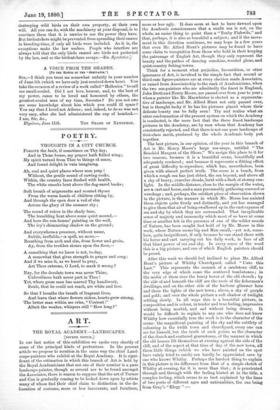11:12, WILD BIRDS' PROTECTION BILL.
(TO THE EDITOR OF TEE SPECTATOR."(
Snt,—Permit me to remark that the Wild Birds' Protection: Bill, brought in by Mr. Dillwyn, and now awaiting consider- ation in Committee of the House of Commons, is thought by many of the most earnest and best-informed friends of the move- ment by no means to deserve the recommendation you have given it. Its chief feature is to make all protection of wild birds (except those that are safeguarded by the Sea-birds and Wild-fowl Acts) depend once more upon the will of the owners and occupiers of land,—the very persons who, by their caprice- or their heedlessness, have brought about the state of things that you and others lament. These persons, and these only, are again to have it in their power to say whether or not birds shall be destroyed in obedience to prejudice, ignorance, mere wanton- ness, or what not. Surely this cannot be a wise or a moderate measure P I, for one, who have long interested myself deeply in this matter, feel strongly that the passing of this Bill, without. considerable amendment, will be a most ill-advised and in some degree a retrograde step. I am not going to defend the existing- Wild Birds' Protection Act, but that Act does give a certain amount of protection to some birds which would otherwise suffer as theyformerly did, and birds which nearly all agree in desiring to encourage,—nightingales, for instance, and owls. This amount of protection would practically be taken away by the new Bill, since it is only by the direction or permission of the owners and occupiers of land that nightingales and owls can be, to any great extent, destroyed or taken, and at present their capture is absolutely prohibited during the breeding-season.—I am, Sir, An ORNITHOLOGIST.
[We gravely differ from our correspondent. We believe that it is simply impossible to prevent owners and, tenants from destroying wild birds on their own property, at their own will. All you can do, with the machinery at your disposal, is to convince them that it is unwise to use the power they have. .Bat birdcatchers might be prevented from spreading their snares in breeding-time, if only all birds were included. As it is, the -exceptions make the law useless. People who interfere are always told that the only birds snared are birds not protected by the law, and so the birdcatchers escape.—En. Spectator.]-



































 Previous page
Previous page